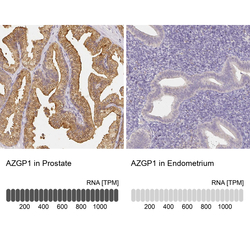Antibody data
- Antibody Data
- Antigen structure
- References [5]
- Comments [0]
- Validations
- Immunohistochemistry [1]
Submit
Validation data
Reference
Comment
Report error
- Product number
- HPA012582 - Provider product page

- Provider
- Atlas Antibodies
- Proper citation
- Atlas Antibodies Cat#HPA012582, RRID:AB_1845226
- Product name
- Anti-AZGP1
- Antibody type
- Polyclonal
- Description
- Polyclonal Antibody against Human AZGP1, Gene description: alpha-2-glycoprotein 1, zinc-binding, Alternative Gene Names: ZA2G, ZAG, Validated applications: WB, IHC, Uniprot ID: P25311, Storage: Store at +4°C for short term storage. Long time storage is recommended at -20°C.
- Reactivity
- Human
- Host
- Rabbit
- Conjugate
- Unconjugated
- Isotype
- IgG
- Vial size
- 100 µl
- Concentration
- 0.1 mg/ml
- Storage
- Store at +4°C for short term storage. Long time storage is recommended at -20°C.
- Handling
- The antibody solution should be gently mixed before use.
Submitted references DIS3L2 knockdown impairs key oncogenic properties of colorectal cancer cells via the mTOR signaling pathway
AZGP1 Protein Expression in Hormone-Naïve Advanced Prostate Cancer Treated with Primary Androgen Deprivation Therapy
A High-throughput Bead-based Affinity Assay Enables Analysis of Genital Protein Signatures in Women At Risk of HIV Infection
Elemental Zn and its Binding Protein Zinc-α2-Glycoprotein are Elevated in HPV-Positive Oropharyngeal Squamous Cell Carcinoma.
Loss of Expression of AZGP1 Is Associated With Worse Clinical Outcomes in a Multi-Institutional Radical Prostatectomy Cohort
García-Moreno J, Lacerda R, da Costa P, Pereira M, Gama-Carvalho M, Matos P, Romão L
Cellular and Molecular Life Sciences 2023;80(7)
Cellular and Molecular Life Sciences 2023;80(7)
AZGP1 Protein Expression in Hormone-Naïve Advanced Prostate Cancer Treated with Primary Androgen Deprivation Therapy
Winther M, Kristensen G, Stroomberg H, Berg K, Toft B, Brooks J, Brasso K, Røder M
Diagnostics 2020;10(8):520
Diagnostics 2020;10(8):520
A High-throughput Bead-based Affinity Assay Enables Analysis of Genital Protein Signatures in Women At Risk of HIV Infection
Månberg A, Bradley F, Qundos U, Guthrie B, Birse K, Noël-Romas L, Lindskog C, Bosire R, Kiarie J, Farquhar C, Burgener A, Nilsson P, Broliden K
Molecular & Cellular Proteomics 2019;18(3):461-476
Molecular & Cellular Proteomics 2019;18(3):461-476
Elemental Zn and its Binding Protein Zinc-α2-Glycoprotein are Elevated in HPV-Positive Oropharyngeal Squamous Cell Carcinoma.
Poropatich K, Paunesku T, Zander A, Wray B, Schipma M, Dalal P, Agulnik M, Chen S, Lai B, Antipova O, Maxey E, Brown K, Wanzer MB, Gursel D, Fan H, Rademaker A, Woloschak GE, Mittal BB
Scientific reports 2019 Nov 18;9(1):16965
Scientific reports 2019 Nov 18;9(1):16965
Loss of Expression of AZGP1 Is Associated With Worse Clinical Outcomes in a Multi-Institutional Radical Prostatectomy Cohort
Brooks J, Wei W, Pollack J, West R, Shin J, Sunwoo J, Hawley S, Auman H, Newcomb L, Simko J, Hurtado-Coll A, Troyer D, Carroll P, Gleave M, Lin D, Nelson P, Thompson I, True L, McKenney J, Feng Z, Fazli L
The Prostate 2016;76(15):1409-1419
The Prostate 2016;76(15):1409-1419
No comments: Submit comment
Supportive validation
- Submitted by
- Atlas Antibodies (provider)
- Enhanced method
- Orthogonal validation
- Main image

- Experimental details
- Immunohistochemistry analysis in human prostate and endometrium tissues using Anti-AZGP1 antibody. Corresponding AZGP1 RNA-seq data are presented for the same tissues.
- Sample type
- Human
- Protocol
- Protocol
 Explore
Explore Validate
Validate Learn
Learn Western blot
Western blot Immunohistochemistry
Immunohistochemistry